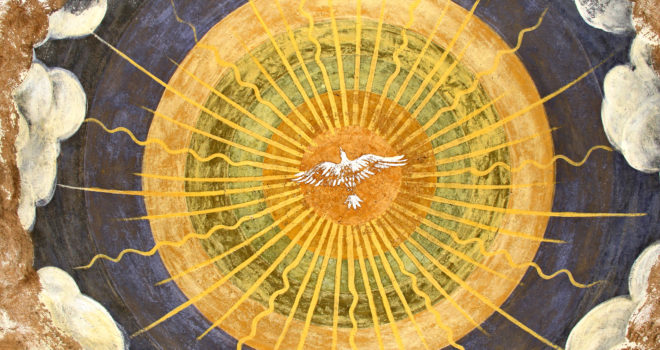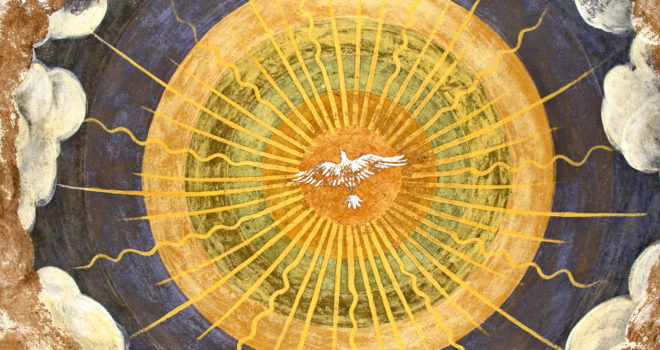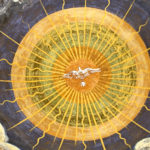For many followers of Christ, there is an understanding, love and prayer that we offer to Jesus. He points us to the Father and consequently we pray the Our Father, as sons and daughters of the Father should pray.
However, for more than a few of us the Holy Spirit, who indeed is the third Person of the Blessed Trinity, remains nebulous, mysterious, and in a real sense unknown. Therefore, it is incumbent upon us to strive for a more clear and penetrating understanding of the “Sweet Guest of the soul.” (Sequence prayer for Pentecost)
Following logic and reason, unless we capture a more profound comprehension of the Holy Spirit, His presence, power and action in our lives will be inhibited, if not paralyzed. Friends long to get acquainted with each other, yearn to spend quality time with each other, so as to appreciate this mutual bond of friendship and rejoice in the successes and weep at the failures in the reality of friendship. So in a parallel sense is our bond of relationship with the Holy Spirit.
In fact, with respect to our relationship with the Trinity, we have a different relationship with each Person. Once baptized we become sons/daughters of God the Father and brothers/sisters to Jesus Christ our Elder Brother. However, with respect to the Holy Spirit, He becomes our Intimate Friend. This bond and depth of Friendship depends on one element: our docility and openness to the Holy Spirit or our lack of it.
With great joy and enthusiasm, let us delve into the infinite riches in getting to know the Holy Spirit better. This deep union with Him will result in the opening of a new vista or horizon in our spiritual life. Indeed He will shine light in our minds and ignite a fire in our hearts transforming us into, in the words of Saint Paul, new creatures in Christ.
This succinct but substantial treatment will serve as a short, mini-catechesis on the Person, the Power, the Presence and the Interior Peace that are all communicated to the soul enamored with the Holy Spirit, the Sweet Guest of the Soul.
Facts That We Should Know About the Holy Spirit:
1. IN THE TRINITY In the Sublime Mystery of the Most Blessed Trinity, the Holy Spirit is actually the Third Person of the Blessed Trinity. In order, the Father is the first Person; the Son, the second Person; and finally, the Holy Spirit, the third Person in the Blessed Trinity.
2. HIS ROLE AND PLACE The Father loves the Son; the Son in turn loves the Father. The Holy Spirit is the mutual bond of love between the Father and the Son. St. Bernard calls the Holy Spirit the mutual embrace between Father and Son.
3. APPROPRIATION Thus, the Father is the Creator and Power; the Son is Wisdom or Logos; the Holy Spirit is the Sanctifier and Uncreated Love in the mystery of the Blessed Trinity.
4. IN THE CHURCH Among the many titles of the Church, one of the most prominent is that of “The Mystical Body of Christ”. The Church is called to glorify God the Father. Jesus is the Head of the Mystical Body. And the Holy Spirit? He is the Soul of the Church, the Mystical Body of Christ. By means of definition: the soul is the life-giving principle.
5. BAPTISM This Sacrament is the door, gateway, or threshold of the life of grace. At the moment of Baptism, the person receives a radical transformation of life. One of the effects is that Baptism transforms us into living Tabernacles of the Blessed Trinity and Living Tabernacles of the Holy Spirit. We become the House or Abode of God Himself.
6. GIFTS OF THE HOLY SPIRIT Also, upon receiving Baptism, the Holy Spirit pours His Seven-fold Gifts into our soul. These are the Seven Gifts of the Holy Spirit. They follow in our catechesis with a brief but clear definition.
7. WISDOM According to Aquinas, the greatest of all, “Wisdom is the Gift in which we relish the things of God.”
8. UNDERSTANDING This Gift that perfects the intellect, allows the mind to penetrate the inner Truths presented in the Word of God and Catholic Doctrines and Teachings.
9. KNOWLEDGE This Gift opens the mind to a deeper awareness of God’s overriding Presence. In a word, we live in the Presence of God. In the words of the Greek poet in our relationship to God: “In Him we live, and move, and have our being.” We become aware of God’s Presence in the beauty of nature, in circumstances, and even in the daily crosses that visit us.
10. COUNSEL This Gift perfects the moral virtue of Prudence and it helps us in the art of decision-making. If you like, right or correct decisions in action. The Gift of Counsel serves as a bridge between the Intellect and the Will.
11. FORTITUDE This Gift communicates to a person real courage, valor, interior strength in the midst of trials and sufferings. It also communicates patience in the midst of the many sufferings in life.
12. PIETY This is the Gift of the Holy Spirit in which we relish our relationship to God our loving Father. And if God is our loving Father, then it necessarily follows that we love all God’s children as our brothers and sisters. In this, there is no room for any traces of racism.
13. FEAR OF THE LORD Keenly aware of our fragility and human weakness, Fear of the Lord moves us to rely not on our own resources and strength, but on the strength that comes from God. Very much related to humility, Fear of the Lord inspires us to avoid sin, knowing the consequences of living and dying in sin could result in the loss of God’s Love and Friendship for all eternity.
14. FRUITS OF THE HOLY SPIRIT Saint Thomas Aquinas points out that the Fruits of the Holy Spirit are related to an inner sweetness that is experienced in the depths of the soul of a person who is collaborating generously with the Gifts of the Holy Spirit. The Fruits of the Holy Spirit are: “charity, joy, peace, patience, kindness, goodness, generosity, gentleness, faithfulness, modesty, self-control, chastity.” (CCC 1832)
15. LOSS OF THE HOLY SPIRIT Even though painful, we must come to terms with the fact that due to the free will with which we were endowed as human persons, we can reject the Presence and Person of the Holy Spirit. Quite simply this happens when we choose to commit a mortal sin. By this act, the Father, Son, and Holy Spirit are expelled from our soul and the enemy enters.
16. RECOVERY OF THE HOLY SPIRIT Good News! The Holy Spirit returns to our soul upon making a perfect Act of Contrition and then having recourse to the Sacrament of Confession as soon as possible.
17. SOLEMNITY HONORING THE HOLY SPIRIT At the conclusion and culmination of the Easter Season—fifty days after Easter—the Church celebrates the Solemnity of Pentecost (a word meaning fifty). This commemorates the conclusion of the first Novena in the Church wherein Mary and the Apostles, praying and fasting in silence in the Upper Room or Cenacle, experienced an event that radically transformed the lives of the Apostles. Following the nine days of prayer and fasting came a powerful wind, almost like an earthquake, with tongues of fire resting over the heads of the Apostles and Mary, and the transformation was effected. These fearful, doubting, insecure, cowardly men became valiant soldiers for Christ, ready to give testimony to their love for Christ by shedding their blood, in imitation of the Master Jesus Himself. Thus, Pentecost is considered the Birthday of the Church.
18. LITURGICAL COLOR FOR PENTECOST? Red: this is the color pointing to the fire that descended upon the Apostles on Pentecost. Red is also for the blood they were willing shed to bring the good news of Salvation to the whole world!
19. READINGS ON THE HOLY SPIRIT? A short, concise, spiritual gem on the topic of the Holy Spirit written by a French Author, Jacques Philippe, is available in both English and Spanish. The title of the book is: “In the School of the Holy Spirit.” The heart or essence of this short gem is that our growth in holiness depends principally upon one disposition of soul: docility and openness to the action, Presence, and Power of the Holy Spirit. This short but good read can change your life!
20. NAMES: TITLES FOR THE HOLY SPIRIT If we sincerely desire to get to know the Person of the Holy Spirit, we might study and pray over some of the names that are given to explain the Person of the Holy Spirit. There are many indeed. I will offer you a mere five: Paraclete, Sanctifier, Sweet Guest of the Soul, Interior Master, Gift of Gifts (from the CCC).
21. SYMBOLS FOR THE HOLY SPIRIT Still another tool we can use to get to know, love, and pray more frequently to the Holy Spirit is to become familiar with some of the symbols for the Holy Spirit. A symbol is not the reality but points by means of an image to the reality. Once again, let us take five symbols for the Holy Spirit: Ardent Fire, Powerful Wind, Gentle Breeze, the Dove, and Finger of God. Read the Catechism of the Catholic Church for greater details. (CCC Part One, Section Two, Chapter Three: I Believe in the Holy Spirit)
22. SACRAMENT OF THE HOLY SPIRIT Although it is true that the Presence and the Power of the Holy Spirit is in every Sacrament, still there is a Sacrament that communicates a special outpouring of the Holy Spirit. That Sacrament is Confirmation. True, in Baptism the Holy Spirit is given, as well as the Gifts of the Holy Spirit. However, through the conferring of the Sacrament of Confirmation, usually administered by the Bishop, the Presence and the Gifts of the Holy Spirit are fortified in the recipient. This enables the confirmed person to both spread the faith, as well as defend the faith.
23. MARY AND THE HOLY SPIRIT The transformation of the Apostles took place on Pentecost after they had been praying and fasting with the Blessed Virgin Mary in the Cenacle for nine days. Love and devotion to Mary is essential for union with the Holy Spirit. Mary is the Daughter of God the Father, Mother of God the Son, and the Mystical Spouse of the Holy Spirit. Saint Louis de Montfort states: “Those who love Mary, the Holy Spirit flings Himself into that soul.” May your love for Mary allow for a profound invasion of the Holy Spirit in your life so that you can become the great saint that God has called you to be from all eternity!
✠
Editor’s note: this article is adapted from a post on Fr. Broom’s blog












